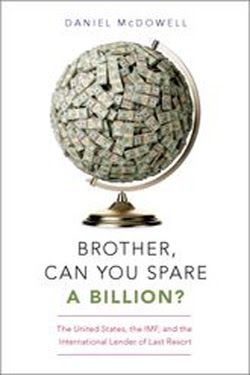Brother, Can You Spare a Billion?: The United States, the IMF, and the International Lender of Last Resort
Daniel McDowell
Oxford University Press, December 2017

When financial crises occur, it has long been accepted that national economies need a lender of last resort to stabilize markets. In today’s global financial system, crises are rarely confined to one country. Indeed, they often go global. Yet, there is no formal international lender of last resort (ILLR) to perform this function for the world economy. Conventional wisdom says that the International Monetary Fund has emerged in recent decades as the de facto ILLR. Yet that premise is incomplete.
This book explores how the United States has for decades regularly complemented the Fund’s ILLR role by selectively providing billions of dollars in emergency loans to foreign economies in crisis. Why would U.S. policymakers ever put national financial resources at risk to bail out foreign governments and citizens to whom they are not beholden when the IMF was created for this purpose? Daniel McDowell, associate professor of political science, argues the United States has been compelled to provide such rescues unilaterally when it believes a multilateral response via the IMF is either too slow or too small to protect vital U.S. economic and financial interests.
Through a combination of historical case studies and statistical analysis, McDowell uncovers the defensive motives behind U.S. decisions to provide global liquidity from the 1960s through the 2008 global financial crisis. The book paints a more complete picture of how international financial crises have been managed and highlights the unique role that the United States has played in stabilizing the world economy in troubled times.